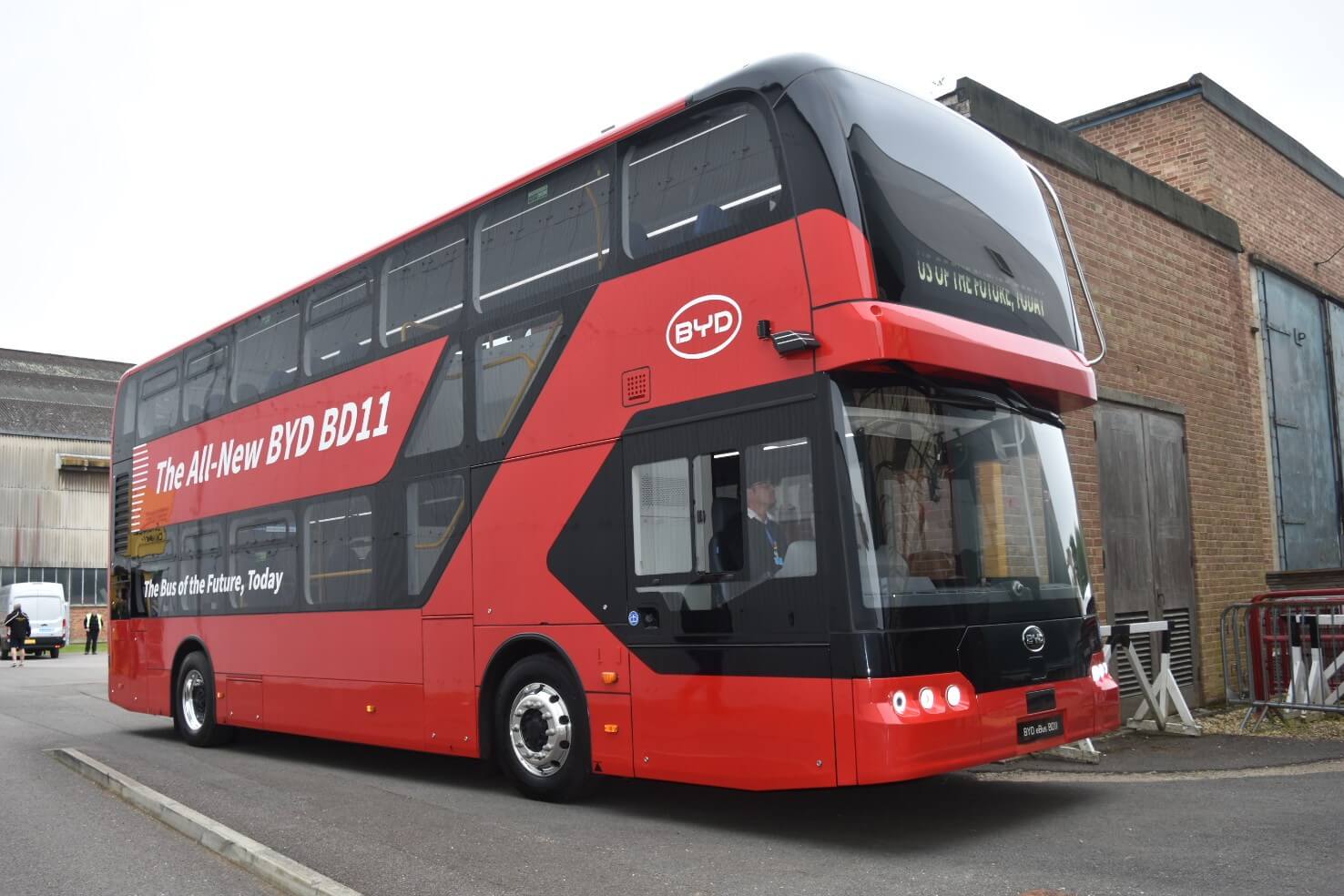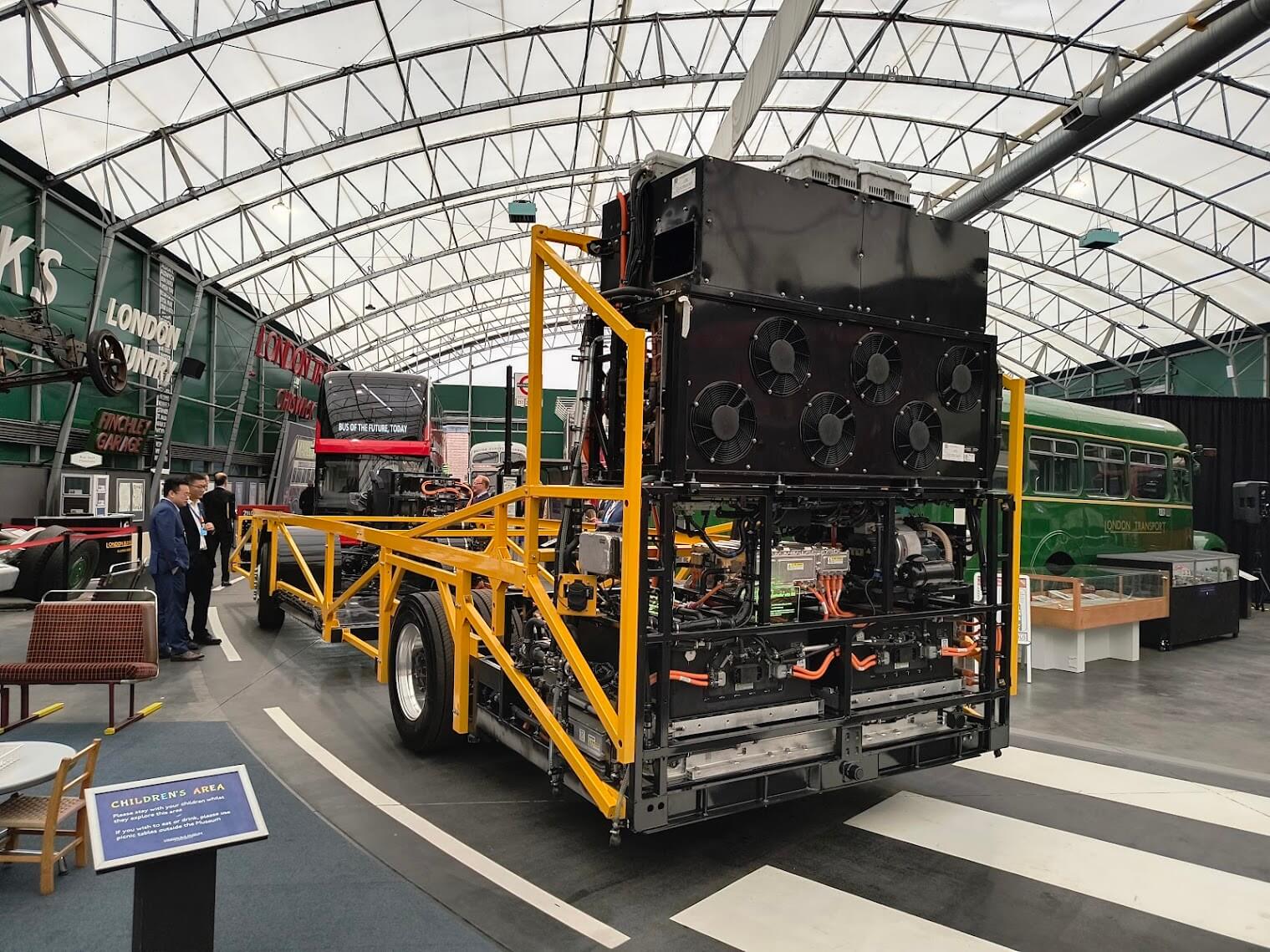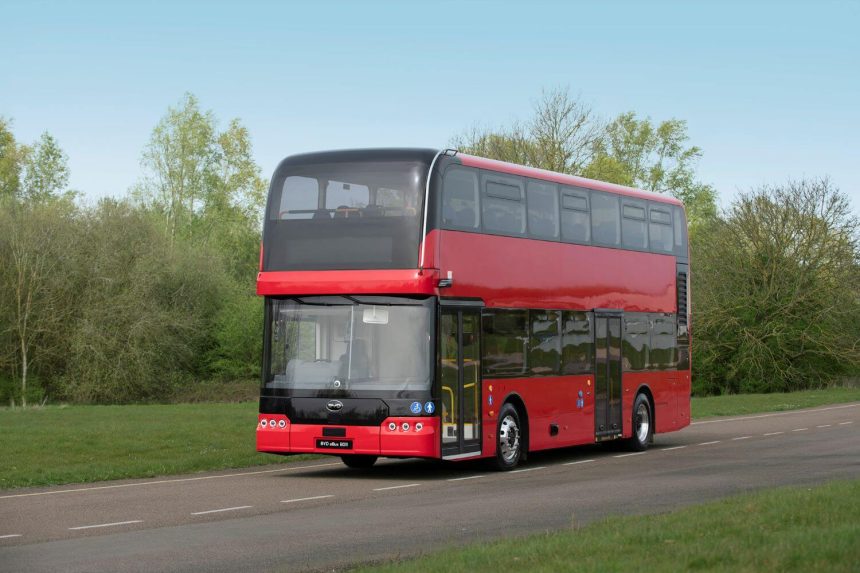Chinese manufacturer BYD’s new bus for the UK represents the start of a long-term aim to build on its base here as it promises to make battery-electric buses a more “viable” commercial option.
Speaking at the launch on 21 May of the BD11 double-decker, Frank Thorpe, Managing Director of BYD UK Commercial Vehicles, said the business would increase its investment into the country’s engineering trade.
The BD11 is built to Transport for London specifications, although BYD is yet to confirm reports that Go-Ahead is lined up to be the first buyer in a deal worth more than 100 units.
A single-decker for the provincial market is planned for the fourth quarter of this year, followed by a single-decker for London in the first quarter of 2025 and a provincial double-decker by the middle of next year. Other options, such as midibus, may follow.
According to BYD, among the biggest selling points of the up-to-90-passenger, 10.9m-long bus is the company’s “revolutionary” Blade battery.
It is claimed the optimised structure of the technology improves space utilisation by 50% versus a traditional battery pack.

In the BD11, it has been integrated into the chassis to save a claimed 8% in the overall weight, increase driving range and leave more room for passengers.
Competitive pricing is partly due to BYD not having to rely on third parties, the business explains.
After having manufactured London’s first current-generation electric bus in 2013 and also having provided the chassis for 1,800 Alexander Dennis (ADL)-bodied buses, the battery technology pioneer’s move to go it alone again in the UK market is a significant one.
Long-term plans
At the event at the London Bus Museum in Weybridge, Mr Thorpe shied away from predicting a rapid shake-up of the market in this country.
“We prefer to evolve,” he says. “We’re not in it for the smash-and-grab; we’re here for the long term.
“We don’t want to disrupt the manufacturing base, but we’re here to sit alongside them.”
What we’re giving you today is a bus that will go further, for longer, for less – Frank Thorpe
Regarding the business’s work with ADL, he adds: “I have a very positive relationship with ADL and I don’t see that changing.
“I think the market has moved towards requiring different solutions and we provide a certain kind of solution, they provide perhaps a different one. I think there’s a place for both of us.”
A ‘viable’ option
The launch prototype was presented to the press within metres of the museum’s example of London’s battery-electric pioneer from BYD, the K9E, used by Go-Ahead and withdrawn in 2018.
BYD is confident that this will be a leap forward on that, thanks in part to its “market-leading” battery capacity of up to 532kWh, which will potentially translate to a claimed range of more than 400 miles after Zemo testing has taken place.
Full charge is possible in two hours via the inverted pantograph option and BYD also places great emphasis on the safety of the Blade technology.
Among the other safety features are advanced driving assistance systems, including advanced emergency braking system, blind spot monitoring, forward collision warning and intelligent speed assistance.
It also features BYD’s six-in-one controller, two 150kW hairpin motors, integrated thermal management system and active suspension control system.
It boasts an 8.00m turning radius — an improvement of 1.3m on BYD’s previous generation of bus.

Mr Thorpe says: “The UK industry needs a viable electric bus. It needs to be viable technically, commercially and operationally.
“We need the bus of the future, but we need it today because the UK bus industry faces some challenges. I believe that is what BYD is bringing to the market. What we’re giving you today is a bus that will go further, for longer, for less.”
He alluded to the fact that cheaper electric buses are needed to meet decarbonisation targets and reduce government subsidy.
“We all as manufacturers need to step up with capacity, with specification, but also with something viable commercially,” he says. “We need to wean ourselves off subsidy so we can do it commercially.”
Saying the vehicle represented good value in terms of total cost of ownership, he adds: “At launches, everyone tends to talk about the shiny stuff, the technology and the specification, but none of that’s any good if it’s not viable for operators to run profitably.”
Chinese whispers
The economic benefits were also highlighted at the launch by BYD in reference to murmurs in Westminster about the government’s Zero Emission Bus Regional Areas scheme money being used to help pay for Chinese imports.
Mr Thorpe says: “I am not going to be ashamed of the fact that we are so competitive, and the reason we’re so competitive is we manufacture the high-value items in the bus, so the battery, the controller and the motor are all designed and manufactured by BYD.
“We’re not buying them in, so we’re not paying someone else’s margins. I’m going to use that advantage and I don’t think there’s anything wrong with that and that’s nothing to do with us being a Chinese business.”
Investing in UK engineering
Further on that theme, Mr Thorpe stressed the value of BYD to the UK engineering industry. “UK bus operators buy the bus from BYD UK Ltd,” he says.
“We’re a UK -registered company, we employ 167 people in the UK, we turn over a significant amount of money, we have substantial premises, assets and equipment, we invest in the UK in a massive way.
Our ongoing and long-term plans are to increase the investment and transfer knowledge and skills to the UK through apprentice schemes – Frank Thorpe
“I’m not going to be embarrassed or ashamed that my core technology comes from China — it does because it’s the best.
“Our ongoing and long-term plans are to increase the investment and transfer knowledge and skills to the UK through apprentice schemes and through our training schemes.
“We bring our knowledge, our technology, our expertise and embed it in the UK and that’s got to be positive.”



























